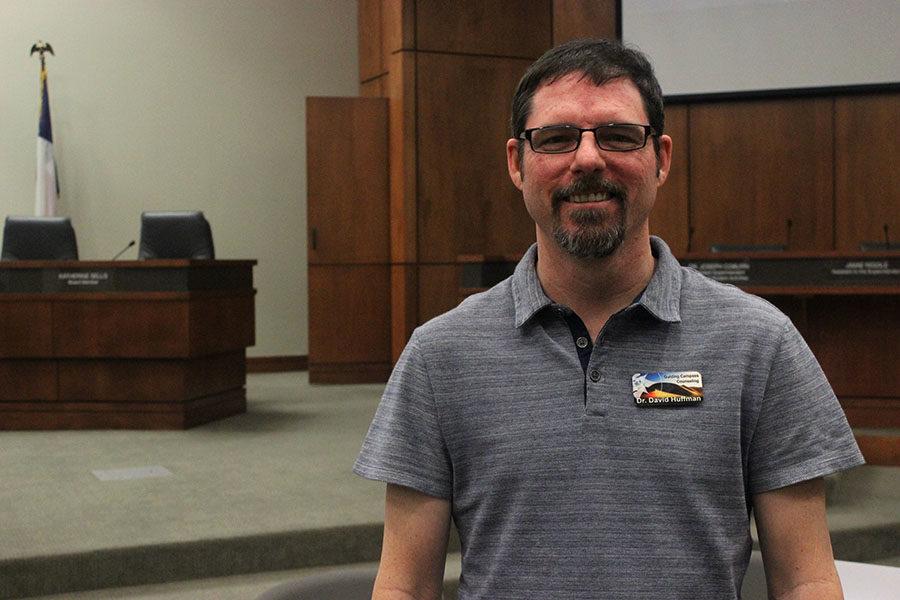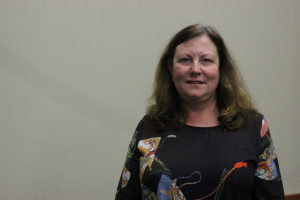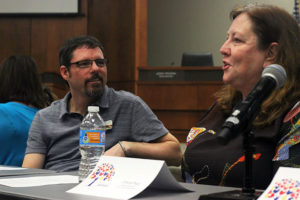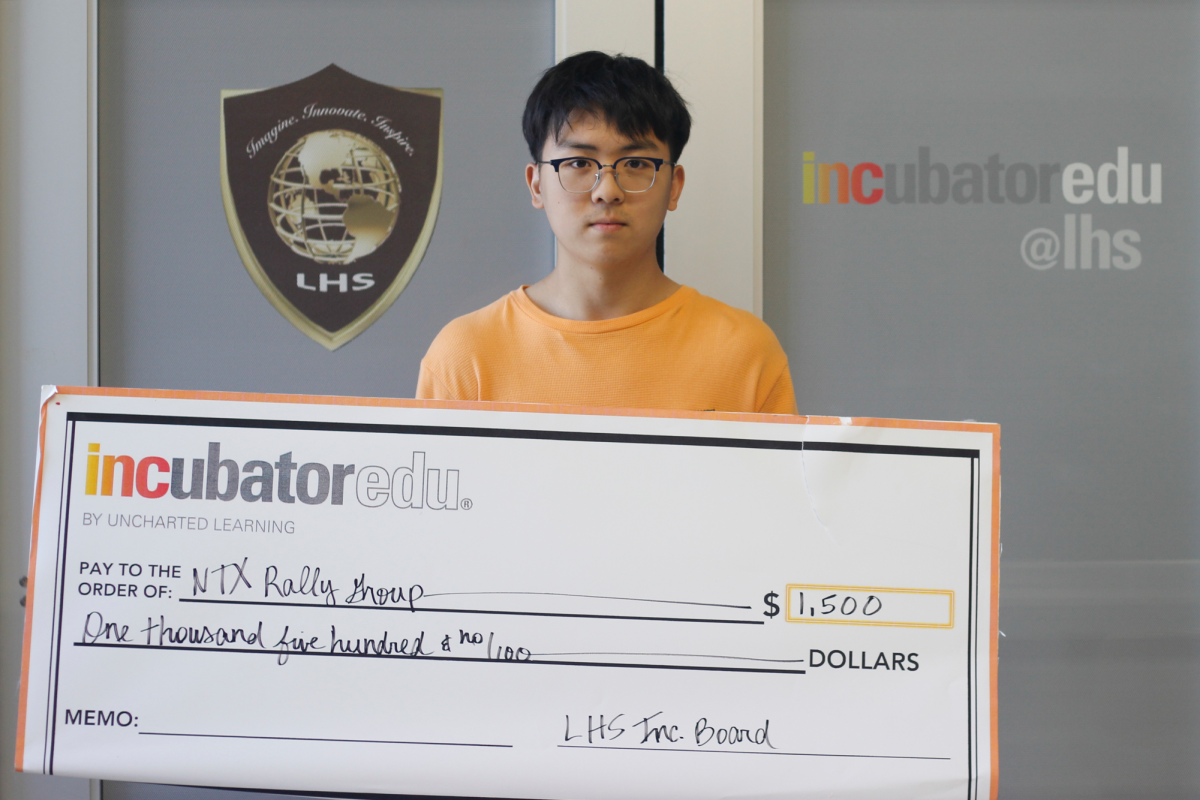From pastor to passion
April 10, 2017
He has always had a passion for helping people, especially youth. At the start of his career he graduated from the Brite Divinity School at Texas Christian University with a Master of Divinity degree. He thought he had found his lifelong mission and began working with various ministries and nonprofit organizations. However, it felt out of place so 15 years later David Huffman found himself attending the University of North Texas to become a therapist where he finally found a sense of belonging.
“In every place I found myself most enjoying the moments when I could sit down with another person and really make a personal connection and understand them and help them find the right path,” licensed professional counselor and supervisor Huffman said.
It wasn’t until after attending counseling himself when he realized his true passion in life and made the decision to change his career to pursue helping others more directly.
“I’m passionate because of my own life,” Huffman said. “Probably one of the biggest things was exploring my own thoughts and feelings, and in the process be understood by another person for exactly who I was. Through joy and pain [I realized] I could come out the other side with more self acceptance, satisfaction and confidence with my life.”
Huffman took this into consideration when he finally opened his own practice, with an end goal of being accessible to people of all backgrounds.
“When we opened Guiding Compass, we knew we wanted to be available to the community,” Huffman said. “I think often times when parents see their children struggling they don’t know where to start and we enjoy being a place where parents can come and learn more.”
In addition to being a certified licensed professional counselor supervisor, Huffman is also one of LISD’s Whole Child Series panelists and an adjunct professor at UNT. Other than his many roles in the community, he is a husband of 17 years to his wife and has two Cocker Spaniels named Oscar and Lucy who he cherishes deeply.
“[My wife and I] like to do fun things together, go out to dinner and we do a date night every week as kind of our way of carving out time together,” Huffman said. “We’re dog people. Our dogs are our children, and so we love doing fun things with them and taking them out.”
When he is not hanging out with his wife and dogs or juggling his active roles in the local community, Huffman is also part of a small band making use of his guitar skills that he developed at age 6.
“Music is really a big part of my life, so playing in my band is awesome,” Huffman said. “Oddly enough [the band is] called Good Therapy. It’s not made up of all counselors though, I’m the only counselor. I play guitar and I sing. We do a lot of vocal harmony, rock and pop, blues and folk and tons of different stuff. We play around town; it’s a blast.”
In his professional career as a therapist, Huffman has a special certification in play therapy. Therapeutic play is a specialized form of counseling that allows therapists to utilize play as the primary language of communication for younger children and helps express their emotions how they would naturally. Huffman is adamant about the benefits of this form of therapy for youth as it helps improve communication and explores emotions.
“Often times words are hard to describe feelings [for youth], so I like to use activities or art or music or sometimes just talking,” Huffman said. “I like working in a way each person is most comfortable.”
Huffman focuses more on his play techniques to develop relationships with his younger clients, but like most therapists, he adapts his counseling techniques to best suit his clients. For other clients who fall into the category of preteens and teenagers, Huffman incorporates both talking and artistic activities.
“I think the most important thing that I do is the relationship I develop with each one of my clients,” Huffman said. “It’s the foundation of growth. If I have a strong relationship with my client [then] they are more likely to feel safe to be themselves with me and be honest and that’s when growth happens.”
While therapists must balance their professional roles as their client’s counselors, Huffman finds he is not immune to the influences his clients often have.
“Every person I meet impacts me and I learn from them and I expand the way I see the world, ” Huffman said. “When you’re a counselor if you stop growing then you’re going to stop being effective.”
Although Huffman impacts his clients and community with his active involvement at the Guiding Compass, he has a larger life goal of impacting the entire community beyond just his clients.
So when LISD’s director of guidance and counseling services Monya Crow contacted Huffman with the hopes that he would have time to partake in the the district’s Whole Child Series as a panelist, Huffman was more than willing to take on the new role.
“The series was born from several student loses this year,” Crow said. “I hope that as a community we continue the conversations. Whatever our students are experiencing, I hope that we keep talking, keep supporting and keep seeking solutions.”
Keeping true to one of his biggest goals, Huffman took on the opportunity to help his community on Tuesday, Feb. 28 as one of several panelists, including licensed therapist Cheryl Rayl, discussing mental health among the youth of the community.
“I wish that conversation [about mental health and suicide] would go on more often, and when I saw it was going to happen I knew it was important to be a part of the conversations,” Huffman said.
The district’s Whole Child Series’ main goal is to bring awareness to the importance of mental health both within the immediate and larger community. Each panelist brings their own knowledge to inform the community about the proper ways to approach mental health.
“Listening is the most important part,” licensed professional counselor and supervisor Cheryl Rayl said. “[People need] someone that’s not judging them, that’s not involved with the problem. A lot of time people will figure out just by talking [out] their own answers.”
Huffman hopes to help improve the stigma of mental health within the community by sharing his expertise with others. His love for strong relationships and guiding youth continues to motivate him to help the younger generations of the community.
“I am finally at the point where I’m finally doing what I was made to do,” Huffman said. “I have a real passion for this.”





